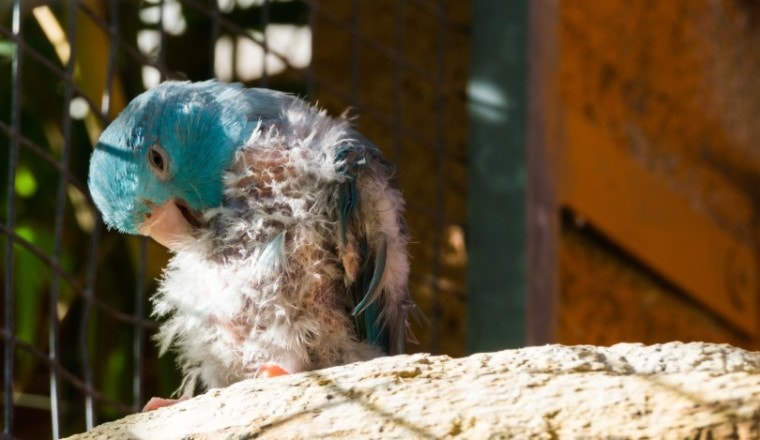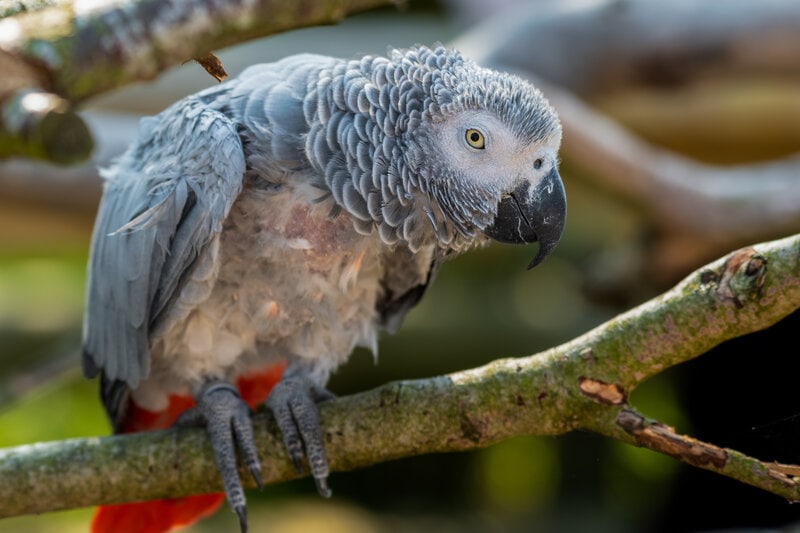
Owning a pet parrot can be a rewarding experience. Parrots have long lifespans and are fun to watch, and are relatively easy to maintain. These aspects make them great companions. However, one common problem that pet birds often face is feather loss. Why do parrots lose their feathers?
Feather loss can be a terrifying experience for inexperienced owners, and it’s not always easy to find the root cause. If you notice feather loss in your bird, keep reading as we look at several explanations for this phenomenon, so you can help keep your bird strong and healthy.
The 6 Reasons for Feather Loss in Parrots
1. Molting
Molting is the most common cause of feather loss in parrots because it happens naturally. Once or twice per year, your parrot will need to shed its worn feathers and replace them with new ones. Molting will leave plenty of feathers on the floor of the cage and will also cause some birds to preen more frequently, making it look like your pet is pulling out its feathers. In reality, it’s renewing the feathers so they perform better.

2. Poor Nutrition
Poor nutrition is a serious problem that can cause feather loss in your bird. Without proper nutrition, the molting process will not go smoothly, which can create quite a bit of stress for your parrot. Poor nutrition can also rob the body of what it needs to create strong feathers, which will cause them to be thin and fragile. These fragile feathers will fall out easily, resulting in significant feather loss. A well-balanced diet according to your parrot’s species-specific needs will provide your pet with the proper nutrition.
3. Feather Plucking
Feather plucking is when your bird starts to pull out its feathers instead of preening and cleaning them. It often starts due to stress from poor nutrition, a noisy environment, or difficulty molting. Feather plucking can result in large bald patches on your bird, so it’s important to take it to the vet as soon as possible to get a remedy.

4. Not Enough Attention
If your parrot isn’t getting the attention that it craves, it can become depressed, which often results in feather plucking. Your bird will try several methods to get your attention before resorting to feather plucking, so it’s important to spend plenty of time with your parrot so you can read the signs if it’s suffering.
Parrots need daily care, company, and environmental enrichment to prevent them from developing aberrant and destructive behaviors. A parrot kept to itself in a cage without attention or enrichment is suffering.
5. Lack of Stimulation
Another reason your parrot might be losing its feathers or is plucking them out is that it is bored. Parrots require plenty of mental stimulation to keep them happy, and the best way to provide this stimulation is to give the birds plenty of time to play around and explore fun ways to interact with their environment. Enrichment and playtime can help keep their spirits up and will give them something to do so they don’t resort to feather plucking or other negative behaviors.

6. Skin Disorder & Disease
Itchy, dry skin resulting from excessive humidity, chemicals, and even dust can cause feathers to fall out prematurely. It can also cause your pet to start plucking its feathers. Keeping humidity levels within normal range and frequently cleaning the cage is the best way to avoid feather loss from skin disorders.
Infectious diseases and parasites can also result in a parrot losing and plucking feathers. If you suspect that your parrot is losing feathers due to a medical reason, please visit the veterinarian.
Will My Parrot’s Feathers Grow Back?
Shedding and regrowing feathers is a natural part of life for your parrot. Even birds with significant bald spots due to plucking will usually regrow their feathers relatively quickly once you resolve the problem that was causing the plucking. However, if you don’t notice the feathers growing back within a few weeks, we recommend taking your pet to the vet to have it looked over to see if there is an underlying medical condition.
Please keep in mind that the longer that a feather plucking issue is left unattended, the more difficult it will be to resolve. Therefore, if you think that your bird’s feather loss is not due to molting, if you notice blood on the feathers, or if you don’t notice the feathers growing back within a few weeks, we recommend taking your pet to the vet to have it looked over to see if there is an underlying medical condition. Your avian veterinarian should also be able to advise you on best practices for your pet parrot’s habitat, diet, and behavioral management. Please do not hesitate to ask for help so you can help your parrot before the issue further complicates.

Conclusion
There are plenty of reasons for feather loss in parrots, but if your bird is healthy and happy, there is a good chance it is only molting, especially if you spend a lot of time with it and give it regular enriching activities, a species-appropriate diet, and daily exercise. If you have one or more barking dogs that spend a lot of time in the same room as your parrot, that can add stress, which might cause your pet to start plucking its feathers. It’s best to move the cage to a quieter part of the house where your bird can relax. We also recommend making sure that your pet is getting high-quality nutrition and that the diet includes all the nutrients that their species needs to stay healthy.
If your bird seems to have a specific condition, please consult a vet, as they can diagnose and treat medical issues behind feather loss in parrots. An avian veterinarian can also give you parrot husbandry advice—your vet is always the best resource!
- You May Also Like: 20 Types of Parrots to Keep as Pets (With Pictures)
Featured Image Credit: Charlotte Bleijenberg, Shutterstock








